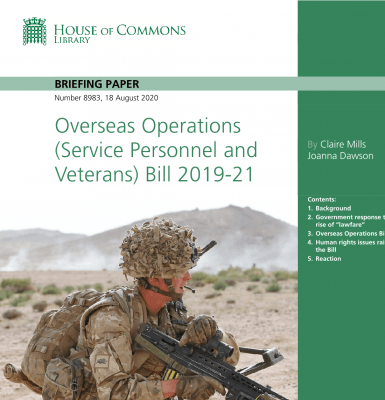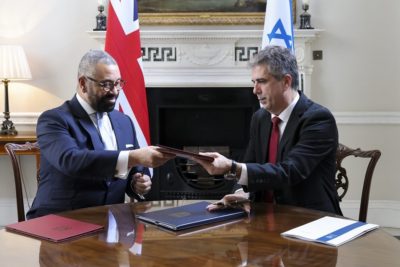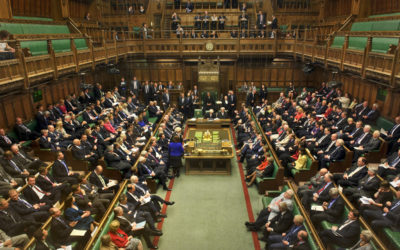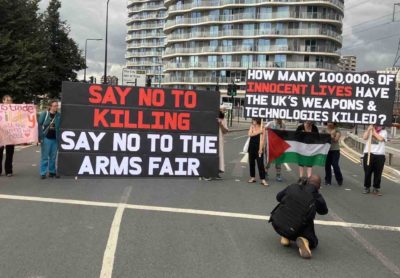The Overseas Operations Bill: A Tale Of Two Militarisms?

The Overseas Operations Bill, which will be introduced to Parliament in September, has finally become a cause of contention between the major political parties. For a number of years the Conservatives had dominated the terrain upon which the legislation and the issues it is meant to address has been debated. Plans to introduce a presumption against guilt in any claims of wartime criminality more than five years old also became 2019 Conservative Manifesto pledge.
ForcesWatch examined myths and realities of these “legacy” allegations, which pertain to the conduct of personnel in Iraq, Afghanistan and Northern Ireland, in a piece which can be read here. It was then-Prime Minister Theresa May who most clearly framed her party’s position, telling the 2016 party conference in an explicitly populist tone: ‘We will never again in any future conflict let those activist left-wing human rights lawyers harangue and harass the bravest of the brave, the men and women of our armed forces.’
The bill has been championed by every Tory prime minister since 2010 and framed by a number of key figures in the party – prominently, army officer-turned-veterans affairs minister Johnny Mercer – as a patriotic defence of UK military personnel and veterans from so-called “vexatious claims”.
Labour, which has been relatively quiet on the issue, including over the period of Corbynism, has now joined this debate with Shadow Defence Secretary John Healey writing to Defence Secretary Ben Wallace to demand a pause in the bill’s progress through parliament to allow for a fuller appraisal of its implications.
Healey warned that legislation could undermine ‘the history and rules-based international order that Britain has sought to construct and maintain’.
He added, ‘This clearly creates the risk that serious violations could go unpunished if an incident does not come to light for five years or if investigations are drawn out beyond that deadline,’
Wallace, himself a former Guards officer, countered in the Sun newspaper which, alongside other right-wing publications like the Daily Mail, has championed the case for war crime indemnity for UK troops. ‘Labour’s new found facade of supporting our armed forces has been exposed for what it is – fake. Pausing the bill is a slap in the face to veterans who have gone through the turmoil of dealing with vexatious claims.’
The MOD also commented to the Sun, saying that this “vital” piece of legislation would ‘protect military personnel and veterans from vexatious claims and the cycle of re-investigation into alleged offences.’
There are a number of notable characteristics in the MOD responses but three stand out.
First, the confidently political tone of the intervention; this is a recent and worrying development, the context of which is discussed here. Secondly, the inference that protecting the troops is what drives the ministry’s interest, in contrast to the case made by critics that the legislation would strip serving and former personnel of their right to sue the MoD. Thirdly, the call to action to support “our armed forces” by passing legislation which would, again, according to critics, make it harder to hold the institution to account.
The politician’s exchanges are also instructive. Wallace’s position is one of a populist conservative militarism – ‘pausing the bill is a slap in the face to veterans’ – while Healey’s is that of the “progressive” militarist, citing (in the style of figures like Blair, Obama and Cameron) a largely mythological ‘rules-based international order’ which, in this liberal interpretation, Britain has ‘sought to construct and maintain’.
There is no discernible space in either position for a critique of conflicts from which legacy allegations have arisen.
An anti-militarist critique of legacy allegations is nowhere represented. There is no discernible space in either position for a critique of conflicts from which legacy allegations have arisen. Both men (and both parties) portray themselves, albeit in quite different ways, as champions of the armed forces community defending the rights of soldiers and veterans against nefarious parliamentary opponents.
The bill will be discussed in Parliament next month but with Labour’s late entry onto the stage, the Conservative’s large majority and their well-established hegemony over this topic makes it hard to see what kind of influence the former can wield.
See more: human rights, legislation & policy,
Like what you read?
> Sign up for our newsletter or blog notifications
> Support our work – from just £2 a month










